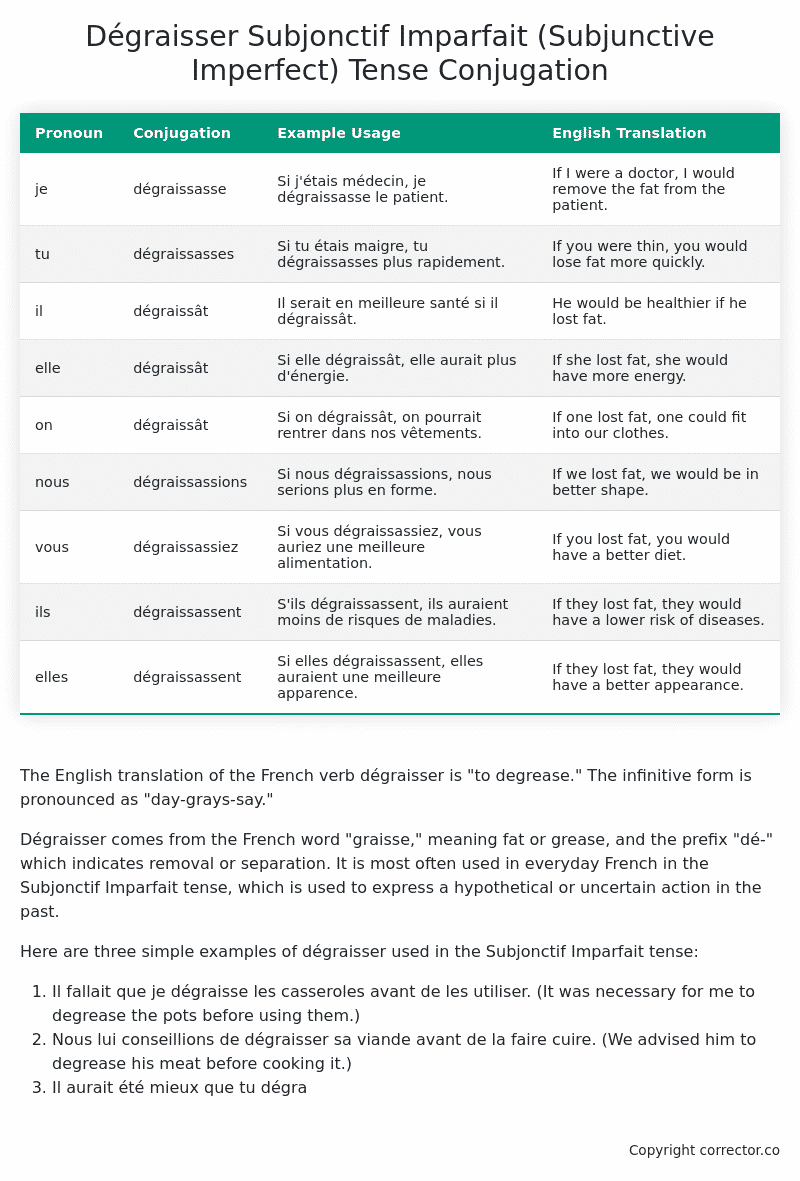Subjonctif Imparfait (Subjunctive Imperfect) Tense Conjugation of the French Verb dégraisser
Introduction to the verb dégraisser
The English translation of the French verb dégraisser is “to degrease.” The infinitive form is pronounced as “day-grays-say.”
Dégraisser comes from the French word “graisse,” meaning fat or grease, and the prefix “dé-” which indicates removal or separation. It is most often used in everyday French in the Subjonctif Imparfait tense, which is used to express a hypothetical or uncertain action in the past.
Here are three simple examples of dégraisser used in the Subjonctif Imparfait tense:
- Il fallait que je dégraisse les casseroles avant de les utiliser. (It was necessary for me to degrease the pots before using them.)
- Nous lui conseillions de dégraisser sa viande avant de la faire cuire. (We advised him to degrease his meat before cooking it.)
- Il aurait été mieux que tu dégra
Table of the Subjonctif Imparfait (Subjunctive Imperfect) Tense Conjugation of dégraisser
| Pronoun | Conjugation | Example Usage | English Translation |
|---|---|---|---|
| je | dégraissasse | Si j’étais médecin, je dégraissasse le patient. | If I were a doctor, I would remove the fat from the patient. |
| tu | dégraissasses | Si tu étais maigre, tu dégraissasses plus rapidement. | If you were thin, you would lose fat more quickly. |
| il | dégraissât | Il serait en meilleure santé si il dégraissât. | He would be healthier if he lost fat. |
| elle | dégraissât | Si elle dégraissât, elle aurait plus d’énergie. | If she lost fat, she would have more energy. |
| on | dégraissât | Si on dégraissât, on pourrait rentrer dans nos vêtements. | If one lost fat, one could fit into our clothes. |
| nous | dégraissassions | Si nous dégraissassions, nous serions plus en forme. | If we lost fat, we would be in better shape. |
| vous | dégraissassiez | Si vous dégraissassiez, vous auriez une meilleure alimentation. | If you lost fat, you would have a better diet. |
| ils | dégraissassent | S’ils dégraissassent, ils auraient moins de risques de maladies. | If they lost fat, they would have a lower risk of diseases. |
| elles | dégraissassent | Si elles dégraissassent, elles auraient une meilleure apparence. | If they lost fat, they would have a better appearance. |
Other Conjugations for Dégraisser.
Le Present (Present Tense) Conjugation of the French Verb dégraisser
Imparfait (Imperfect) Tense Conjugation of the French Verb dégraisser
Passé Simple (Simple Past) Tense Conjugation of the French Verb dégraisser
Passé Composé (Present Perfect) Tense Conjugation of the French Verb dégraisser
Futur Simple (Simple Future) Tense Conjugation of the French Verb dégraisser
Futur Proche (Near Future) Tense Conjugation of the French Verb dégraisser
Plus-que-parfait (Pluperfect) Tense Conjugation of the French Verb dégraisser
Passé Antérieur (Past Anterior) Tense Conjugation of the French Verb dégraisser
Futur Antérieur (Future Anterior) Tense Conjugation of the French Verb dégraisser
Subjonctif Présent (Subjunctive Present) Tense Conjugation of the French Verb dégraisser
Subjonctif Passé (Subjunctive Past) Tense Conjugation of the French Verb dégraisser
Subjonctif Imparfait (Subjunctive Imperfect) Tense Conjugation of the French Verb dégraisser (this article)
Subjonctif Plus-que-parfait (Subjunctive Pluperfect) Tense Conjugation of the French Verb dégraisser
Conditionnel Présent (Conditional Present) Tense Conjugation of the French Verb dégraisser
Conditionnel Passé (Conditional Past) Tense Conjugation of the French Verb dégraisser
L’impératif Présent (Imperative Present) Tense Conjugation of the French Verb dégraisser
L’infinitif Présent (Infinitive Present) Tense Conjugation of the French Verb dégraisser
Struggling with French verbs or the language in general? Why not use our free French Grammar Checker – no registration required!
Get a FREE Download Study Sheet of this Conjugation 🔥
Simply right click the image below, click “save image” and get your free reference for the dégraisser Subjonctif Imparfait tense conjugation!

Dégraisser – About the French Subjonctif Imparfait (Subjunctive Imperfect) Tense
Formation
Common Everyday Usage Patterns
Interactions with Other Tenses
Subjonctif Présent
Indicatif Passé Composé
Conditional
Conditional Perfect
Summary
I hope you enjoyed this article on the verb dégraisser. Still in a learning mood? Check out another TOTALLY random French verb conjugation!


